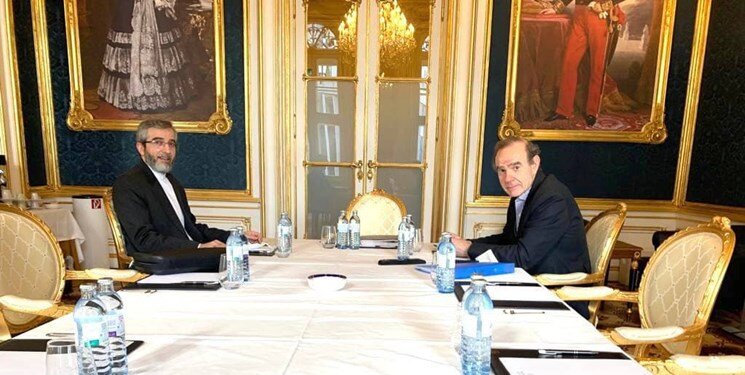Iran’s Bagheri meets EU chief negotiator

TEHRAN – Iran’s lead negotiator at the Vienna talks Ali Bagheri Kani met with the European Union’s chief negotiator Enrique Mora on Friday as the eighth round of talks goes on.
The meeting took place at Palais Coburg, a five-star luxurious hotel where the talks are being held between Iran and the P4+1 group of countries – China, Russia, France, and Britain plus Germany.
Bagheri Kani is also expected to hold a joint meeting with Mora and the heads of delegations of the three European countries that are signatory to the 2015 nuclear deal – France, Germany and the UK (E3).
In a phone call with United Nations Secretary-General Antonio Guterres on Thursday, Iran’s Foreign Minister Hossein Amir-Abdollahian described the Vienna talks as positive and reiterated the Islamic Republic’s serious determination to reach a good agreement in the shortest time possible.
Amir Abdollahian reaffirmed lack of trust in the White House’s rulers and emphasized the need for America and the Western side to adopt practical, tangible and verifiable measures in order to prove the possibility of achieving a lasting, reliable deal.
Amir Abdollahian on Wednesday briefed the National Security and Foreign Policy Committee of the Iranian parliament on the latest developments in the Vienna talks. He told the lawmakers sitting on the committee that the will of the Islamic Republic of Iran to reach a good, stable and reliable agreement is definite.
Earlier, Mahmoud Abbaszadeh Meshkini, the spokesman for the parliamentary committee, said Iran is seeking to make a win-win deal at the Vienna talks aimed at removing U.S. sanctions on Iran.
He noted that removing all U.S. sanctions on Iran is a priority for Tehran.
“The Islamic Republic is looking for a win-win agreement, and it looks like we will reach a relatively good agreement with the parties by the end of this year,” he said in an interview with the Islamic Consultative Assembly News Agency (ICANA), referring to the Iranian calendar year ending on March 20.
He said, “The Americans want to maintain the structure of sanctions, but the Islamic Republic knows their purpose, so it is not affected by their pressure. The Americans and the Westerners are conveying concerns to us and tending to impose a bad deal on Iran, meaning that they will benefit from the deal with us without benefiting Iran.”
According to Meshkini, the priority of the Islamic Republic is the lifting of all sanctions, but the priority of the Americans is to limit Iran's nuclear technology and shut down Iran's nuclear industries.
He noted, “We negotiate well because we have the experience of previous rounds of negotiations and the JCPOA is a valuable experience for us. In the past, we could not include the necessary guarantees in the JCPOA, and the United States withdrew from the agreement at no cost, so this experience is very valuable to us.”
The lawmaker added, “The Islamic Republic has gone through maximum sanctions. Of course, the people were under a lot of livelihood pressures, and this passage was not without cost, but the Americans imposed economic pressures on the people with the aim of imposing further cost. Sanctions have been almost neutralized and our oil sales are increasing daily.”
Hossein Nosh-Abadi, a member of the committee, has said that the U.S. can return to the 2015 nuclear deal, formally called the Joint Comprehensive Plan of Action (JCPOA), but at first it must compensate the damages resulting from its withdrawal from the pact.
Nosh-Abadi said the U.S. unilateral withdrawal from the Iran deal was an obvious violation of international law and a breach of the pact which is by no means justifiable.
The U.S., by unilaterally withdrawing from the Iran deal, avoided its JCPOA commitment, the lawmaker said, adding that if the U.S. wants to return to the Iran deal, it must live up to its past commitments.
Leave a Comment